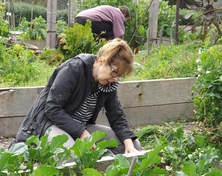
By Linda Gordon
WHAT do these good-looking, hard-working local people have in common? Yes, they were all working in the Wonthaggi Community Garden in the sunshine last week.
But what may not be obvious to you, or even to them. was that the closer they got to the dirt, the better their chances of dodging depression, rheumatoid arthritis, certain cancers and Crohn’s Disease.
WHAT do these good-looking, hard-working local people have in common? Yes, they were all working in the Wonthaggi Community Garden in the sunshine last week.
But what may not be obvious to you, or even to them. was that the closer they got to the dirt, the better their chances of dodging depression, rheumatoid arthritis, certain cancers and Crohn’s Disease.
It’s not the dirt as such, but soil bacteria called mycobacterium vaccae, which researchers in the UK and US have linked to positive chemical changes in the body and brain. The tests were first reported in the scientific journals in 2007, and were followed by more tests on mice.
Mycobacterium vaccae appears to affect the brain’s serotonin levels in a good way, making us feel contented. Sadly there does not seem to be an over-the- counter tablet at the chemist just yet.
The good news is that just being within breathing distance of the bacteria could be enough exposure to get the brain changing.
Wonthaggi gardening regulars Marianne and Lorraine said that quite apart from the other benefits of gardening they almost always felt better after “getting their hands in the dirt”.
They recommended getting children into the garden often and allowing them to get dirty.
A report this month on gut bacteria on the ABC’s science program Catalyst demonstrated the importance of “feeding” our healthy bacteria to treat a wide range of diseases and conditions.
You know where I’m going with this. Get outside, find some soil and start digging. Even better, start feeding your own, personal bacteria with the veggies and fruit you grow.
If you need a hand to get started or you’d like a bit of company along the way, you can join community gardens in Bass Coast at Wonthaggi (the Harvest Centre and Wonthaggi Community Centre), Cowes and Coronet Bay. There are also community gardens at Leongatha and Korumburra, Fish Creek, Foster and Yinnar.
Mycobacterium vaccae appears to affect the brain’s serotonin levels in a good way, making us feel contented. Sadly there does not seem to be an over-the- counter tablet at the chemist just yet.
The good news is that just being within breathing distance of the bacteria could be enough exposure to get the brain changing.
Wonthaggi gardening regulars Marianne and Lorraine said that quite apart from the other benefits of gardening they almost always felt better after “getting their hands in the dirt”.
They recommended getting children into the garden often and allowing them to get dirty.
A report this month on gut bacteria on the ABC’s science program Catalyst demonstrated the importance of “feeding” our healthy bacteria to treat a wide range of diseases and conditions.
You know where I’m going with this. Get outside, find some soil and start digging. Even better, start feeding your own, personal bacteria with the veggies and fruit you grow.
If you need a hand to get started or you’d like a bit of company along the way, you can join community gardens in Bass Coast at Wonthaggi (the Harvest Centre and Wonthaggi Community Centre), Cowes and Coronet Bay. There are also community gardens at Leongatha and Korumburra, Fish Creek, Foster and Yinnar.